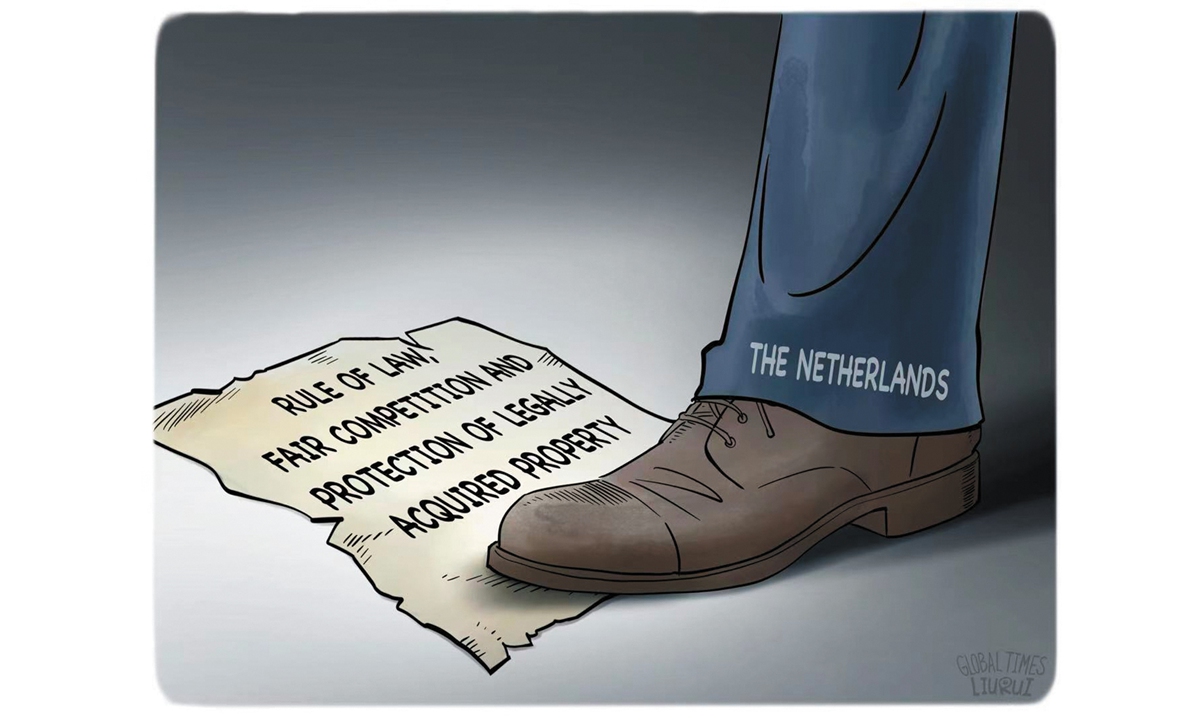
Illustration:Liu Rui/GT
Recent reports indicate that Dutch Minister of Economic Affairs Vincent Karremans has expressed a willingness to reach a solution with China regarding the reported export ban on Nexperia’s chips. Words alone are far from sufficient. The Netherlands must demonstrate genuine courage to correct its fundamental mistakes rather than merely offering diplomatic pleasantries while hoping the storm will pass.
Let us be crystal clear about what transpired. Nexperia was legally acquired by China’s Wingtech Technology in 2018 for $3.6 billion. Yet recently, the Dutch government for the first time used the Goods Availability Act – a Cold War-era emergency law – to seize control of Nexperia, citing “national-security” concerns. The Goods Availability Act was designed to secure the availability of essential goods during a national emergency. It was never intended as a tool for routine interference in corporate governance.
According to a Reuters report, the Dutch court document said records from a June 12 meeting between US Commerce Department officials and the Dutch Foreign Ministry showed rising pressure to remove Nexperia’s Chinese CEO to help keep the company off a US “entity list.”
By weaponizing emergency powers against a company that has operated transparently in the Netherlands for years, the Netherlands has set a dangerous precedent that private property rights can be suspended at the government’s whim whenever political winds shift.
Nexperia was acquired through legitimate commercial transactions, has created thousands of jobs in the Netherlands, and has complied with local regulations. Yet without judicial proceedings, without evidence of actual wrongdoing, and without due process, Chinese shareholders found their management rights summarily stripped away. This is not the behavior of a nation committed to the rule of law, it is the behavior of a government that treats law as a convenient tool to be deployed or discarded based on political expediency.
The Dutch government claims to worry that Nexperia might transfer manufacturing to China – but this is speculation, not evidence. It is guilt by association, not guilt by action. If Chinese ownership itself constitutes a security risk, then the Netherlands is essentially declaring that it operates on a system of ethnic and national discrimination in business. This logic, if universally applied, would destroy the entire framework of international investment.
Should China then consider all Dutch investments in China as potential national security threats? Should every country seize foreign assets based on hypothetical future scenarios rather than actual conduct?
The question brings us to a fundamental error: the surrender of Dutch sovereignty and independence. Court records reveal that the Netherlands received marching orders from Washington and complied. It is not the conduct of a sovereign nation making independent decisions based on its own laws and interests – it is the conduct of a client state implementing policies dictated by a more powerful patron. The Netherlands has spent decades building a reputation as a stable, law-abiding base for international business. This single episode threatens to unravel that reputation in ways that will take years to repair.
The global implications of this dispute extend far beyond bilateral China-Netherlands relations. The precedent being set is that governments can retroactively invalidate commercial transactions and seize corporate control from foreign investors by invoking vague “national security” concerns without providing evidence, following a judicial process, or establishing an international legal basis. If this becomes the new normal, the entire architecture of international investment – built on principles of legal security, contract sanctity, and property rights – will crumble.
The Netherlands should not mistake China’s preference for dialogue and negotiation as a sign of weakness. China has both the will and the capacity to defend legitimate property rights. Minister Karremans’ expressed willingness to find a solution is a first step, but concrete actions must follow. Diplomatic statements cost nothing; changing policy requires courage.
China is not demanding that the Netherlands choose sides in a geopolitical competition. China is simply demanding that the Netherlands honor its own proclaimed values: rule of law, fair competition, and protection of legally acquired property.
Source link
